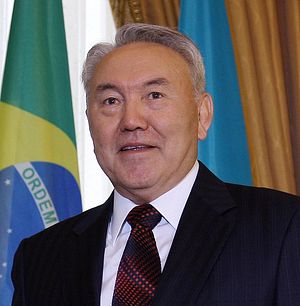Pakistani Prime Minister Nawaz Sharif and Kazakh President Nursultan Nazarbayev met in Astana, Kazakhstan on Wednesday to discuss avenues to advance cooperation between their two countries. Sharif and Nazarbayev expressed their interest in deepening trade ties as well as expanding bilateral cooperation in a range of fields, including energy, science, information technology, and defense. The two leaders additionally discussed international issues. Nazarbayev and Sharif most recently met informally on the sidelines of the 2015 Shanghai Cooperation Organization (SCO) summit in Ufa, Russia—Kazakhstan is an SCO member while Pakistan is expected to gain full membership in 2016.
“Pakistan wants strong economic and trade cooperation with Kazakhstan during his visit to the country,” Sharif noted at a joint press conference with Nazarbayev, adding that he had “invited [Kazakhstan] to join CPEC (China-Pakistan Economic Corridor) and they have kindly accepted.” Nazarbayev framed Sharif’s visit to Astana as the beginning of a new era in ties between the two countries: “In light of new realities, it is time to start a new page in the bilateral relations between Kazakhstan and Pakistan,” he said.
The two countries have a preferential trade agreement between them, but trade and investment volumes remain low. In 2009, Pakistani and Kazakh officials convened a working group, with Kyrgyz representatives, to discuss trade and investment cooperation. Pakistan’s access to western China and Central Asia was greatly expanded by the reconstruction and renovation of the strategically critical Karakoram Highway in the 2000s. Since then, however, there has been little follow-up—both sides expect this leaders summit to lead to greater cooperation.
Nazarbayev, according to Dawn, noted that “the lack of infrastructure between the two countries was an impediment to improved relations,” reiterating concerns stated in a 2012 report produced by the Embassy of Kazakhstan in Pakistan. Chinese President Xi Jinping’s New Silk Road initiative, which strives to improve infrastructure and interconnectivity to China’s west, including in Central Asia and Pakistan, would help address this. For Kazakhstan, increased connectivity with Pakistan, including via CPEC, would help its goods find their way to warm water ports in Gwadar and Karachi—for a landlocked state like Kazakhstan, whose economic fortunes are tied closely to Russia, this sort of access could be incredibly valuable.
Nazarbayev, who has led Kazakhstan since 1989, visited Pakistan in 1992. That trip resulted in the two countries establishing formal diplomatic and consular ties. Pakistan additionally became one of the first states to recognize Kazakhstan as an independent state after the dissolution of the Soviet Union, a fact that Nazarbayev referenced in his remarks: “[I] will never forget that Pakistan is one of the first countries to support our independence,” he told Sharif.

































